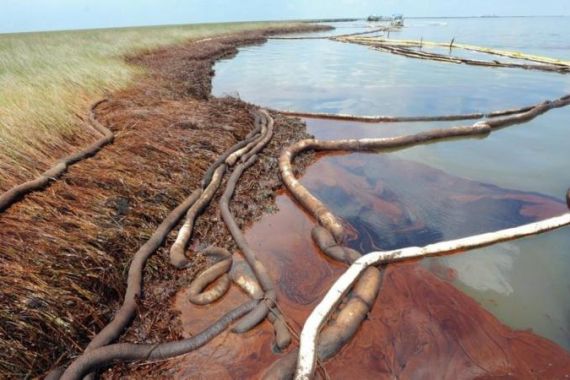US trial over Gulf oil spill resumes
Fines for BP could run into the billions of dollars, as UK oil giant and plaintiff’s argue over extent of leak.

A US federal trial over the 2010 Gulf oil spill has resumed, with a focus on BP’s response to the disaster, with billions of dollars at stake as the two sides argue over how much oil was leaked into the Gulf of Mexico.
The government and BP have different estimates of the extent of the leak, and establishing how much oil flowed into the Guld during the 86-day struggle to cap the well will help determine the penalties the oil company must pay.
Keep reading
list of 4 itemsPalestinian Prisoner’s Day: How many are still in Israeli detention?
‘Mama we’re dying’: Only able to hear her kids in Gaza in their final days
Europe pledges to boost aid to Sudan on unwelcome war anniversary
US District Judge Carl Barbier was expected to hear two hours of statements on Monday from lawyers for BP and for Gulf Coast residents and businesses who claim the spill cost them monetary damages.
The second phase is divided into two segments. The first explores methods BP employed to cap the well. The second is designed to help Barbier determine how much oil spilled into the Gulf.
The first phase of the trial ended in April this year, after Barbier heard eight weeks of testimony about the causes of the blowout.
Claims BP ‘lied’
BP insists it was properly prepared to respond to the disaster, but plaintiffs’ attorneys will argue the UK-based global oil company could have capped the well much sooner if it had not ignored decades of warnings about the risks of a deep-water blowout.
The plaintiffs’ lawyers, who are teaming up with attorneys for the five Gulf states and two of BP’s contractors for the second phase of the trial, also claim BP repeatedly lied to federal officials and withheld information about the volume of oil that was flowing from the well.
“It should pay the price for its choices. BP should be held accountable for the lengthy delay caused by its fraud,” they wrote in a pretrial court filing.
BP maintains its spill preparations complied with every government requirement and met industry standards. But the April 20, 2010, blowout of its Macondo well, more than 1.6km beneath the surface of the Gulf of Mexico and 80km off the Louisiana coast, presented “unforeseen challenges”, the company’s attorneys wrote.
“With these uncertain and unique conditions, one overarching principle governed the team’s work: ‘Don’t make it worse,'” they wrote, saying BP deserved “recognition, not condemnation” for its spill response efforts.
The second phase is scheduled to last 16 days over four weeks. The last three weeks will focus on the question of how much oil spilled into the Gulf.
Dispute over fine
Under the Clean Water Act, a polluter can be forced to pay a maximum of either $1,100 or $4,300 per barrel of spilled oil. The higher maximum applies if the company is found grossly negligent, as the government argues BP should be.
Congress passed a law dictating that 80 percent of the Clean Water Act penalties paid by BP must be divided among the Gulf states.
Judge Barbier has outlined a rigid schedule for attorneys to present their arguments and evidence – and a court reporter will use a chess clock to keep track of time.
The Justice Department’s experts estimate 4.2 million barrels, or 666 million litres, spilled into the Gulf. BP has urged Barbier to use an estimate of 2.45 million barrels, or nearly 389 million litres, in calculating any Clean Water Act fines.
Both sides agree that 810,000 barrels (128 million litres), escaped the well but was captured before it could pollute the Gulf.
The difference in figures could amount to a difference of billions of dollars in fines. If the government figures are used, a maximum penalty could total $18 billion, while using the company’s figures that number would be around $10.5 billion.
A “penalty phase” for the trial has not been scheduled yet.